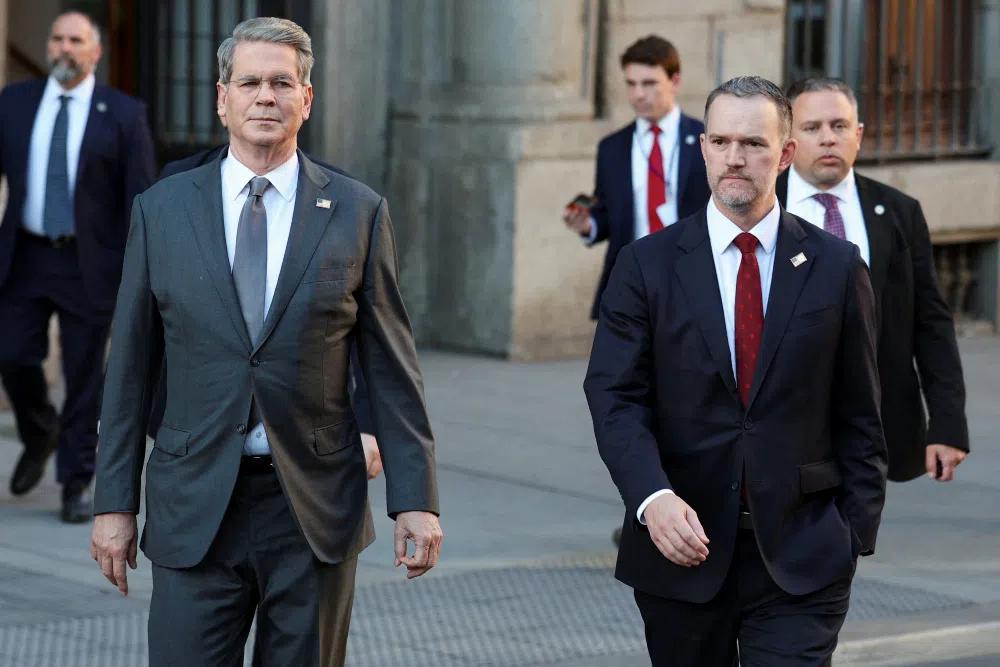WASHINGTON (Reuters) -Top U.S. officials headed to Malaysia on Wednesday to defuse a spike in U.S.-China trade tensions over Beijing’s move to curb exports of rare earth magnets, and keep next week’s planned meeting of U.S. President Donald Trump and Chinese President Xi Jinping in South Korea on track.
U.S. Treasury Secretary Scott Bessent said U.S. Trade Representative Jamieson Greer was already en route to Kuala Lumpur and he would head there later on Wednesday, before joining Trump for the rest of his Asia trip.
Trade tensions between the U.S. and China, the world’s two biggest economies, have flared in recent weeks after months of relative calm. Trump imposed additional duties of 100% on China that are due to take effect on November 1 after China announced export controls on nearly all rare earths.
“This is China versus the globe. It’s not just on the U.S.,” Bessent told Fox Business Network’s “Kudlow” program. “This licensing regime that they’ve proposed is unworkable and unacceptable.”
He said the U.S. and its Western allies were contemplating how to respond if they were unable to negotiate a pause in Beijing’s plans, or some other relief.
“I’m hoping that we can get this ironed out this weekend so that the leaders can enter their talks on a more positive note,” he said. Bessent described the planned meeting as a “pull-aside”, in what may be an attempt to dampen expectations.
Greer, the top U.S. trade negotiator, told CNBC’s “Squawk Box” program that there was still a spot on the schedule for Trump to meet Xi, but it would be up to both parties whether the meeting took place on the sidelines of an economic conference in South Korea next week.
Trump is scheduled to travel to Kuala Lumpur for a meeting of the Association of Southeast Asian Nations that begins on Sunday, and later that week is expected in South Korea ahead of a leaders’ summit of the Asia-Pacific Economic Cooperation forum that is being held October 31-November 1 in Gyeongju.
Bessent said Trump would also stop in Japan to meet the new prime minister, Sanae Takaichi.
The U.S. Treasury chief said he was optimistic that two days of “fulsome” talks with Chinese officials would lay the groundwork for a good meeting of the two leaders, noting that Trump had great respect for Xi.
But U.S. officials are preparing a harsher response if China does not back down on the rare earth licensing changes.
Reuters reported earlier that the Trump administration is considering a plan to curb a wide range of software-powered exports to China, from laptops to jet engines, to retaliate against Beijing, following Trump’s threat earlier this month to bar “critical software” exports to China.
CHINA VIOLATED COMMITMENTS, GREER SAYS
Washington also announced sweeping new sanctions against two Russian oil companies, but stopped short of imposing tariffs on China, one of the largest buyers of Russian oil, as it has done with India, another big purchaser.
Greer and Bessent have both stressed they do not want to decouple from China, or escalate the situation, but insist the United States needs to rebalance trade with China after decades of very limited access to Chinese markets.
Trump on Tuesday insisted any deal with China had to be fair and suggested the meeting with Xi could still be scrapped.
“Maybe it won’t happen,” he said at a White House lunch with Republican senators. “Things can happen where, for instance, maybe somebody will say, I don’t want to meet, it’s too nasty. But it’s really not nasty, it’s just business.”
Greer told CNBC that China’s rare measures violated a commitment its officials had made months ago to keep supplying rare earths needed for high technology, but said the U.S. and China could find a new balance.
“There notionally is a good landing zone for the United States and China where we trade in a way that’s more balanced, and we’re trading in non-sensitive goods, and where we have a constructive relationship,” Greer said.
“The U.S. has always been quite open to the Chinese, and it’s really been driven by Chinese policies that exclude U.S. companies and drive overcapacity and overproduction in China. None of that works for the United States,” he said. “We can’t live that way anymore so we need an alternative path.”
Greer said Trump and other U.S. officials would raise concerns about China’s moves to stop purchasing U.S. soybeans and sorghum, which he said were intended to deliberately hurt U.S. farmers.
“Obviously the president will raise…we all…raise this with them,” he said, noting that China still has unfulfilled obligations to buy agricultural and manufactured goods under a trade deal signed during Trump’s first term.
(Reporting by Andrea Shalal and Susan Heavey; Additional reporting by Trevor Hunnicutt; Editing by Andrew Heavens, Sharon Singleton, Andrea Ricci and Nia Williams)





Comments